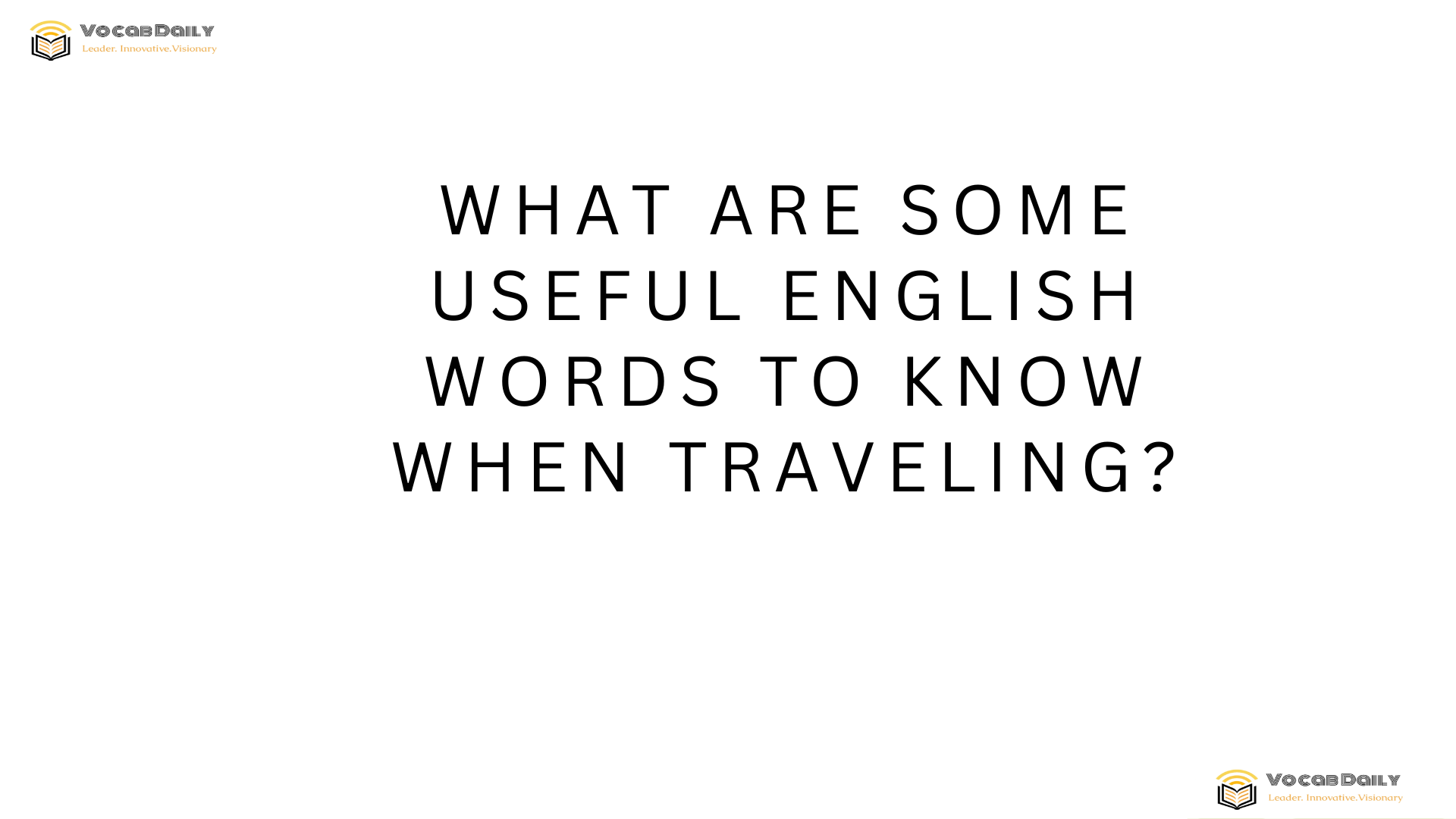What are some useful English words to know when traveling
Essential Travel Greetings and Polite Expressions
When traveling to English-speaking countries or interacting with English speakers worldwide, using polite greetings and common expressions helps create a positive first impression. Simple words like “hello,” “good morning,” and “thank you” go a long way in making connections smoother.
Common greetings and polite expressions include:
- Hello
- Hi
- Good morning
- Good afternoon
- Good evening
- Please
- Thank you
- Excuse me
- Sorry
- Yes / No
Mastering these simple words helps create a respectful and friendly atmosphere, especially when asking for help or directions.
Numbers and Time Vocabulary
Numbers and time-related words are essential during travel for reading schedules, ticketing, prices, and appointment times. Knowing how to express numbers, days, months, and telling time in English ensures you stay organized.
Helpful number-related words include:
- One, two, three… (up to at least twenty)
- Dozen
- Half
- Quarter
- Price
- Cost
For telling time, words like “o’clock,” “minutes,” “quarter past,” “half past,” and “quarter to” are useful.
Example phrases:
- “What time does the bus arrive?”
- “The train leaves at half past three.”
- “How much does this ticket cost?”
Transportation and Directions Vocabulary
Travel often involves using taxis, buses, trains, or airplanes, so understanding transportation vocabulary can make your journey smoother. Asking for directions is also a key skill.
Important transportation words to know include:
- Bus
- Train
- Taxi
- Airport
- Ticket
- Schedule
- Platform
- Station
- Gate
Directional words that help you navigate include:
- Left
- Right
- Straight
- Near
- Far
- Next to
- Across from
- Behind
Sample questions travelers often use:
- “How do I get to the bus station?”
- “Is the train on platform 3?”
- “Where is the taxi stand?”
- “Can you show me the way to the airport?”
Accommodation Vocabulary
Knowing accommodation-related words will help when booking hotels or hostels and during check-in or check-out. Common terms may also help in describing your preferences or needs.
Key accommodation words include:
- Hotel
- Hostel
- Reservation
- Check-in
- Check-out
- Room
- Key
- Reception
- Lobby
- Suite
- Bathroom
- Wi-Fi
Example phrases:
- “I have a reservation under the name Smith.”
- “Is breakfast included in the price?”
- “Can I get a room with a balcony?”
- “What time is check-out?”
Food and Dining Vocabulary
Trying local cuisine is a big part of travel. Knowing food and dining vocabulary helps with ordering meals, asking questions about ingredients, and understanding menus.
Important food-related words and phrases include:
- Menu
- Appetizer
- Main course
- Dessert
- Drink / Beverage
- Water
- Vegetarian
- Vegan
- Allergy
- Spicy
- Bill / Check
- Tip
Example sentences:
- “Can I see the menu, please?”
- “I am allergic to nuts.”
- “Is this dish spicy?”
- “Could we have the bill, please?”
Emergency and Health Vocabulary
Knowing some key emergency and health-related words could be critical during unexpected situations. It is important to communicate clearly with medical staff or ask for help.
Essential vocabulary includes:
- Help
- Emergency
- Doctor
- Pharmacy
- Hospital
- Medicine
- Pain
- Allergy
- Accident
- Police
- Lost
Sample phrases you might need:
- “I need help.”
- “Is there a pharmacy nearby?”
- “I have an allergy to penicillin.”
- “Call the police!”
- “Where is the nearest hospital?”
Shopping and Money Vocabulary
Travel often includes shopping for souvenirs or essentials. Knowing key words related to shopping and money helps communicate clearly with sellers and understand prices.
Common shopping and money words include:
- Price
- Discount
- Cash
- Credit card
- Receipt
- Change (money returned)
- Bag
- Customer
- Store / Shop
- Open / Closed
Useful expressions when shopping:
- “How much is this?”
- “Do you accept credit cards?”
- “Can I get a discount?”
- “Can I have a bag, please?”
- “I would like to return this.”
Common Questions and Phrases for Travelers
When traveling, being able to ask common questions helps you communicate your needs effectively. Here are some frequently used phrases and their vocabulary:
- “Where is…?”
- “How do I get to…?”
- “What time…?”
- “Can you help me?”
- “I don’t understand.”
- “Do you speak English?”
- “Is it far?”
- “Can I have…?”
- “I need…”
Learning these phrases early on can make simple interactions much easier and reduce stress when navigating unfamiliar environments.
Transportation Ticketing and Boarding Vocabulary
Understanding ticketing and boarding vocabulary is crucial for a smooth transit experience, especially in airports or long-distance train stations.
Key words include:
- Boarding pass
- Ticket
- Gate
- Departure
- Arrival
- Delay
- Cancel
- Luggage / Baggage
- Carry-on
- Check-in counter
Common phrases to know:
- “Where is the check-in counter?”
- “Is my flight on time?”
- “When does boarding start?”
- “Where can I pick up my luggage?”
Cultural Etiquette and Social Vocabulary
Understanding basic cultural and social vocabulary can help avoid misunderstandings and show respect for local customs.
Words to be familiar with include:
- Custom
- Tradition
- Respect
- Gift
- Invitation
- Festival
- Holiday
Example phrases:
- “Is it polite to tip in this country?”
- “What are some local customs I should know?”
- “Thank you for your hospitality.”
By familiarizing yourself with these travel-related English words and phrases, you will feel more confident and prepared during your trips. They will help you navigate airports, hotels, restaurants, and public transit smoothly, while also assisting in emergencies and cultural interactions.
Also check out VocabDaily workbook collections.

Leave a Reply